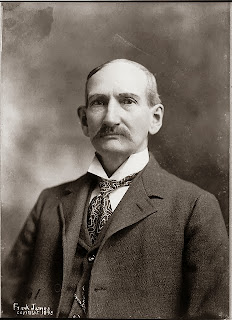In 1868 my 2nd cousin Sarah
Elizabeth Pearis married David Emmons Johnston born in Pearisburg in 1845. He
was well educated and a writer. He became a judge and Vice President of a brand
new bank, Princeton Bank & Trust that had
recently opened in Princeton West Virginia. Judge Johnston was the attorney for
the bank.
He was also a soldier in the Confederate Army and wrote The Story of a Confederate Boy in the Civil
War.
In January 1843 Alexander Franklin
James was born and 4 years later he would meet his little brother Jesse. You
may know him better as Frank James, bank-robber member of the Younger-James
Gang.
What you may not know is that Frank was very well educated, an avid
reader and very well versed in the works of Shakespeare. He was a soldier in
the Confederate Army during the Civil War.
Judge Johnston built a house in
Princeton for his family.
It had 7 fireplaces, 4 bedrooms, 2 kitchens, 2
bathrooms a receiving room and a grand circular staircase. Inside the home was
a vertical Schubert piano.
This home, owned by Johnston was one
of only two structures that survived the burning of Princeton during the Civil
War. A smaller building on the property served as Princeton’s first post
office.
The James Gang happened to be
Huntington when they heard rumor of a new bank in Princeton. Frank went to
investigate. He arrived in town and entered the bank posing as a salesman. The
building was still in the stages of completion and as of yet still did not have
a safe. Frank claimed he was a salesman from a company that made safes. He was
advised to seek out Mr. Johnston the banks attorney and Vice President. He was
invited into the home of the Johnston’s. He stayed for dinner, he played the
piano, and he exchanged war stories with Mr. Johnston. The following day Frank
left town and returned to Huntington. The bank was not robbed.
Was the bank not robbed because it was
small? Because there was not a safe and Frank assumed there was no money? Did
he bond with the Johnston’s while he enjoyed an evening of intellectual
conversation and music around the piano? Was the fact that Princeton suffered
during the Civil War reason to leave them in peace?
The James Gang did have a policy that
they would not “rob a banking institution presided over and owned by an
ex-Confederate soldier."
In August of this year the
Pearis-Johnston Home was auctioned and demolished.
Probably to make room for a Walmart.
Tomorrow ….. maybe we will chat about Reverend
Robert Sallee James.








No comments:
Post a Comment